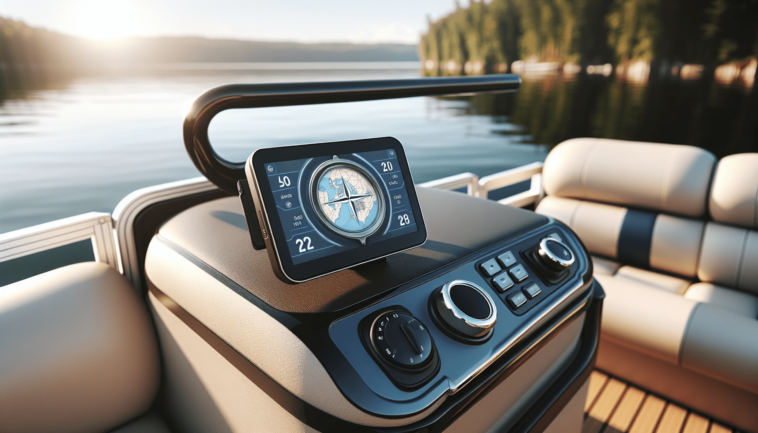Imagine cruising along the calm waters on a beautiful sunny day, with a gentle breeze blowing through your hair. As you look out at the horizon, you can’t help but wonder, do pontoon boats have GPS navigation? Well, the answer to that question might surprise you. In this article, we will explore the world of pontoon boats and discover whether or not they come equipped with this modern-day navigational tool. So, sit back, relax, and let’s set sail on this informative journey.
What is a pontoon boat?
Definition
A pontoon boat is a type of recreational boat that is characterized by a flat deck that is supported by pontoons. These pontoons are hollow structures that provide buoyancy to the boat and allow it to float on water. Pontoon boats are popular for their stability, spaciousness, and versatility. They are often used for various recreational activities such as cruising, fishing, and entertaining.
Features
Pontoon boats typically feature a wide and flat deck, which allows for ample seating and space for activities. They are equipped with pontoons on either side of the boat, which provide buoyancy and stability in the water. Most pontoon boats have a bimini top or canopy to provide shade and protection from the sun. They also come with various seating options, storage compartments, and amenities such as coolers, grills, and stereo systems.
Uses
Pontoon boats are used for a wide range of recreational activities. They are popular for cruising lakes and rivers, as they provide a comfortable and stable platform for leisurely rides. Pontoon boats are also favored by anglers, as they offer ample space for fishing equipment and can accommodate multiple people. Additionally, pontoon boats are often used for entertaining and socializing, as they can be equipped with amenities such as bars, tables, and loungers.
GPS navigation on pontoon boats
Importance of GPS navigation
GPS navigation on pontoon boats can be highly beneficial for a variety of reasons. Firstly, it enhances safety by providing accurate positioning and navigation information. This is particularly useful for boating in unfamiliar waters or during low visibility conditions. GPS navigation also allows for efficient route planning and helps boaters avoid hazards such as sandbars or shallow areas. Furthermore, it provides navigation assistance for reaching specific destinations, such as marinas, fishing spots, or scenic locations.
Availability of GPS on pontoon boats
GPS navigation systems are increasingly becoming a standard feature on modern pontoon boats. Many boat manufacturers now offer GPS units as optional or built-in features. This allows boaters to have access to reliable navigation tools without the need for additional installation or equipment. Additionally, standalone GPS systems can be easily installed on pontoon boats, providing flexibility for boaters who want to customize their navigation setup.
Types of GPS systems on pontoon boats
There are different types of GPS systems available for pontoon boats. One common type is a chartplotter, which combines GPS navigation with electronic charts and maps. Chartplotters display the boat’s position on a digital map, allowing boaters to easily navigate and plan routes. Another type of GPS system is a handheld GPS device, which is portable and can be used both on and off the boat. These devices provide basic navigation functions and are suitable for smaller boats or personal use.
Benefits of GPS navigation on pontoon boats
Safety
GPS navigation significantly enhances safety on pontoon boats. Accurate positioning information allows boaters to identify potential hazards and avoid them, ensuring a safe and enjoyable boating experience. In case of an emergency, GPS navigation can also provide vital information for rescuers or other boaters to locate the boat quickly.
Efficiency
GPS navigation improves efficiency by enabling boaters to plan routes and navigate more effectively. It helps reduce fuel consumption and travel time by providing the most efficient routes to the desired destination. Furthermore, GPS systems often have features such as speed monitoring and trip logging, allowing boaters to optimize their boating experience and keep track of their journeys.
Navigation assistance
GPS navigation systems provide valuable navigation assistance for boaters. They can offer real-time information on the boat’s speed, heading, and distance to the destination. Some GPS systems also include features such as waypoint navigation, which allows boaters to mark and navigate to specific locations. This is particularly useful when navigating channels, fishing spots, or other points of interest.
Factors to consider when choosing a pontoon boat with GPS navigation
Budget
When considering a pontoon boat with GPS navigation, it is important to consider your budget. The cost of pontoon boats can vary significantly depending on factors such as size, brand, and additional features. Built-in GPS navigation systems may be more expensive compared to standalone devices, so it is essential to determine your budget and prioritize the features that are most important to you.
Type of GPS system
There are different types of GPS systems available for pontoon boats, as mentioned earlier. Consider the specific needs and preferences of your boating activities when choosing a GPS system. If you primarily go boating in familiar waters, a handheld GPS device may suffice. However, if you frequently venture into unknown or larger bodies of water, a chartplotter with electronic charts and maps may be a more suitable option.
Integration with other features
When selecting a pontoon boat with GPS navigation, consider how well the GPS system integrates with other features of the boat. Check if the system can be easily controlled and operated from the helm or if it can be connected to other onboard electronics. Integration with additional features such as fishfinders, stereos, or radar can enhance your boating experience and provide a seamless navigation setup.
Popular pontoon boat models with GPS navigation
Model 1
One popular pontoon boat model that offers GPS navigation is the XYZ Pontoon Boat. This model features a built-in chartplotter with a large display, allowing for easy navigation and route planning. The XYZ Pontoon Boat also integrates the GPS system with other features such as a fishfinder and stereo system, providing a comprehensive boating experience.
Model 2
Another popular pontoon boat model with GPS navigation is the ABC Luxury Pontoon Boat. This model offers a choice between a built-in chartplotter or a handheld GPS device. The ABC Luxury Pontoon Boat also includes additional features such as a bimini top, loungers, and a bar, making it suitable for entertaining and leisurely rides.
Model 3
The DEF Offshore Pontoon Boat is a popular model for those who enjoy boating in larger bodies of water. This model comes equipped with a high-end chartplotter and electronic charts, ensuring precise navigation even in challenging conditions. The DEF Offshore Pontoon Boat also offers integration with radar and automatic identification systems (AIS), further enhancing safety and navigation capabilities.
Installation and maintenance of GPS navigation on pontoon boats
Installation process
Installing a GPS navigation system on a pontoon boat can be a straightforward process. Built-in GPS systems are typically installed during the manufacturing process, and the boat is delivered ready to use. For standalone GPS devices, installation usually involves mounting the device to a suitable location on the boat, connecting it to a power source, and ensuring a clear view of the sky for optimal satellite reception.
Maintenance tips
To ensure the longevity and optimal performance of the GPS navigation system on your pontoon boat, regular maintenance is essential. Keep the system clean and free from dirt, debris, or water. Check for any loose connections or wiring issues and address them promptly. Regularly update the GPS software and electronic charts to ensure accurate and up-to-date navigation information. It is also advisable to keep the GPS device or chartplotter protected from extreme weather conditions or prolonged exposure to sunlight.
Alternative navigation options for pontoon boats
Traditional compass
While GPS navigation is highly beneficial, some boaters may prefer using traditional navigation methods such as a compass. A compass can provide a basic sense of direction and heading, particularly useful when navigating in smaller bodies of water or on familiar routes. However, it is important to note that a compass alone might not provide the same level of accuracy and functionality as a GPS navigation system.
Chartplotters
Chartplotters are an alternative option for pontoon boats that want a more comprehensive navigation setup. These devices combine GPS navigation with electronic charts, providing boaters with a detailed and interactive map of the waterways. Chartplotters can offer advanced features such as depth soundings, navigational aids, and route planning capabilities. They are particularly popular among boaters who frequently venture into unfamiliar waters or engage in activities such as fishing or cruising.
Understanding GPS navigation features
Waypoints
Waypoints are precise locations that can be marked and saved in the GPS navigation system. They are useful for marking important locations such as favorite fishing spots, marinas, restaurants, or points of interest. Waypoints allow boaters to easily navigate to these locations and can be customized with additional information such as the name, description, or coordinates.
Charts and maps
GPS navigation systems often include electronic charts and maps, providing boaters with detailed visuals of the waterways. These charts display important information such as water depths, navigational aids, marina locations, and hazards. Electronic charts can be updated regularly to ensure accurate and up-to-date navigational information.
Automatic identification system (AIS)
AIS is a technology that allows boats to communicate with each other and exchange vital information such as position, speed, and heading. Some GPS navigation systems on pontoon boats may include AIS capabilities, which can enhance safety by providing real-time information about nearby vessels. AIS can help boaters avoid collisions and navigate more effectively, particularly in crowded or busy waterways.
Weather information
Some GPS navigation systems can provide real-time weather information, including forecasts, wind speed, and wave heights. This feature allows boaters to make informed decisions about their boating plans and ensure they are prepared for changing weather conditions. Having access to weather information is particularly important for safety and planning purposes.
Regulations and safety guidelines for GPS navigation on pontoon boats
Local regulations
Before using GPS navigation on a pontoon boat, it is essential to familiarize yourself with the local boating regulations and guidelines. Different bodies of water may have specific rules regarding navigation equipment, speed limits, or restricted areas. Ensure that the GPS system on your pontoon boat complies with these regulations and that you operate the boat in a safe and responsible manner.
Safe operation practices
While GPS navigation can enhance safety, it is important to remember that it is not a substitute for responsible boating practices. Maintain a proper lookout at all times and be aware of other vessels, swimmers, or navigational hazards. Keep a safe distance from other boats and maintain a reasonable speed. Always follow the rules of navigation, such as yielding the right of way and obeying signage or buoys. Regularly check and update your GPS device or chartplotter to ensure accurate and reliable navigation information.
Conclusion
GPS navigation offers numerous benefits for pontoon boat owners, enhancing safety, efficiency, and navigation assistance. With the availability of different GPS systems, boaters can choose the option that best suits their needs and preferences. When selecting a pontoon boat with GPS navigation, consider factors such as budget, type of GPS system, and integration with other features. Regular maintenance and adherence to regulations and safety guidelines are crucial for optimal performance and safe operation of GPS navigation systems on pontoon boats. Whether you opt for built-in GPS systems or standalone devices, GPS navigation will undoubtedly enhance your boating experience and make your adventures on the water more enjoyable.








